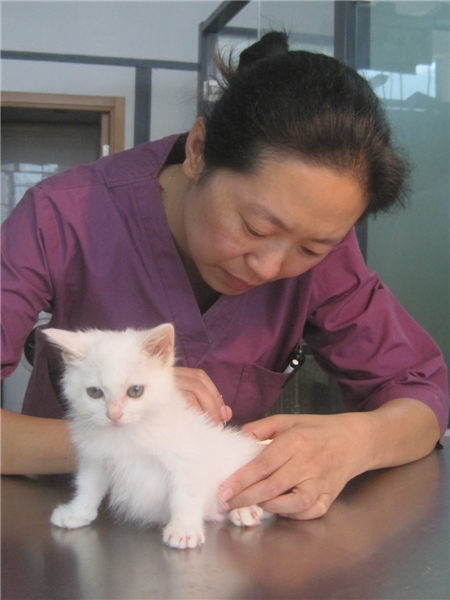Driven by the love of four-footed partners
Updated: 2015-08-14 07:54
By Sun Yuanqing(China Daily)
|
||||||||
 |
|
A stray kitten receives a health check at the International Center for Veterinary Services in Beijing. Provided to China Daily |
When Chinese-American Mary Peng came to Beijing in the early 1990s, she could not find any international-standard veterinary hospital for her adopted cat, Boo Boo.
A decade later, the MBA graduate of Columbia University came back to China's capital to open one, providing international-level medical care to both locals and expats. Her clients list includes ambassadors and Beijingers alike.
"Love cannot be categorized," says Peng, cofounder and CEO of International Center for Veterinary Services. "A pet is part of the family. When one is sick, the whole family is sick."
To make up for the void of veterinary professionals in China, the hospital has created a legally authorized veterinary learning exchange for local and foreign veterinarians. It has also launched humane animal welfare programs, providing medical treatment for shelter pets, matching families with homeless pets, and offering pet import and export counseling.
"It's like your child," Peng says. "You don't want to leave your child behind when you move to another country."
ICVS has so far helped more than 5,000 pets to travel with their owners, both within China and to more than 180 countries worldwide.
Peng has also been encouraging more people to adopt rather than buy pets since the animal-sales market is very much unregulated and often cruel. Female pets are usually made to breed too often in overcrowded environments, which lead to malnutrition and behavior problems in the next generation, she says.
At ICVS, 90 percent of the animal patients are adopted by their owners.
"We are very proud of that," Peng says.
While it has become much easier for foreigners to own a pet in Beijing, there are still problems.
Enoch Li from Hong Kong and her husband, Australian Tim Coghlan, have lived in Beijing for more than six years. Their Shiba Inu dog, Bamboo, is now 4 years old. It is difficult for them to find clean outdoor space to walk their pet, they say.
In addition, some of the owners do not put their dogs on leashes, which leads to fighting. Coghlan was once bitten by an unleashed dog when he was separating it from his own dog in a fight. Although the injury was not serious, Li says dog owners should know to put their pets on a leash while outside to prevent such incidents.
Li is also annoyed that some dog owners in Beijing do not pick up their dog's poop. She suggests that a special area be set up in public space for pets' discharging.
Anne Hak from the Netherlands adopted two cats after she arrived in Beijing three years ago. The formerly skinny and sick kittens have grown very attached to her and her boyfriend over the years.
At the same time, she has noticed that many of the shelters in Beijing are so full that they no longer accept new animals. She suggests more shelters and spaces be built for homeless pets.
The variety of pet food available in Beijing is still limited, but the expatriate community has been coming up with solutions.
Canadian Dan Christensen and his girlfriend, Tao Zhu, found it difficult to trust the packaged, commercial dog food in supermarkets, so they started cooking for their dog, and offering the prepared food to their friends. The response was so good that it encouraged them to expand it to a business.
The two started Penny's Food Studio, a pet-food service, in March, providing fresh, handmade dog food to local pet owners. The food can be delivered to the purchasers' doorsteps weekly.
They now have a clientele of nearly 400, 70 percent of whom are Chinese. They are now thinking about promoting the business in Shanghai.
"Considering how many pets there are, the number of customers is still quite small," Christensen says.
sunyuanqing@chinadaily.com.cn
Most Viewed
Editor's Picks

|

|

|

|

|

|
Today's Top News
12 firefighters among 44 killed in Tianjin explosions
Hacking blame a US power play: experts
Seattle's tallest building sold
Alibaba falls behind Amazon
Seven killed, 180 injured in N China blast
S. Korean president to visit US in October: White House
Hillary Clinton relents in e-mail inquiry amid campaign
Accusations of Chinese hacking are a US power play, experts say
US Weekly

|

|













